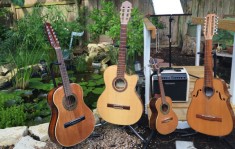| | A: | Ô Andreia, você sabe tudo sobre violões, não é?
Hey Andreia, you know a lot about guitars, right? |
| |
B: | Mais ou menos, por quê?
More or less, why? |
| |
A: | Olha, meu filho quer comprar um violão e é mais difícil do que eu pensava. Tem elétricos, acústicos, de 6 cordas, 7 cordas, cordas de aço, cordas de nylon. É muito confuso, né?
Well, my son wants to buy a guitar e it is more difficult than I thought. There are electric ones, acoustic ones, six string, seven string, steel strings, nylon strings. It’s very confusing, right? |
| |
B: | Ah é verdade. Que tipo de música seu filho gosta de tocar?
Ah that is true. What kind of music does your son want to play? |
| |
A: | Olha, ele gosta muito de clássicas da bossa nova.
Well, he likes the classics of Bossa Nova. |
| |
B: | Bom, nesse caso, talvez um violão clássico com cordas de nylon sirva. As cordas de nylon são mais flexíveis e tem um braço mais longo, que permite melhor dedilhamento. É uma boa opção para iniciantes, viu?
OK, in that case, perhaps a classical guitar with nylon strings would do. The nylon strings are more flexible and neck is a little longer, which allows for better fingerpicking. It’s a good option for beginners, you know? |
| |
A: | Dedilha, dedilhamento, o que que isso?
Finger, fingerpicking, what is that? |
| |
B: | Ah, tá ô! Em vez de usar uma palheta, a gente usa os dedos para tocar. Isso é o dedilhamento.
Ah, OK! Instead of using a pick, people play with their fingers. That is fingerpicking. |
| |
A: | Ah, OK. E que mais que eu devo considerar?
Ah, OK. And what else should I consider? |
| |
B: | Bom, meu caro, o preço, né, se é fácil de tocar, o som que produz, e a aparência. Você vai querer usar um violão e achar que é algo, né, bonito, uma obra prima.
Well, my dear, the price of course, right? And if it’s easy to play, the sound it makes, and its appearance. You are going to want to play a guitar that you think is, you know good looking, a work of art. |
| |
A: | Sei. E quanto mais ou menos eu devo gastar por isso aí?
Got it. And how much more or less should I spend for this? |
| |
B: | Bom, isso depende, viu? Mas para iniciante, ao invés de comprar um dos bem caros, escolha um mais barato. Mas não se esqueça de comprar um “case”, quer dizer uma capa para o violão. A final você não vai querer estar sempre se incomodando com as batidas ou os arranhões.
Well, that depends, you know? But for beginners, instead of buying an expensive one, choose a cheaper one. But don’t forget to buy a case, that is a covering for your guitar. After all, you aren’t going to want to always be worrying about it getting bumped and scratched. |
| |
A: | OK. E quando você disse que é fácil de tocar, fácil de tocar como assim?
OK. And when you say easy to play, easy to play in what way? |
| |
B: | Ah tá. Quer dizer, escolha um instrumento que tenha as cordas próximas aos trastes, mas não tão próximas que elas produzam um zumbido. É a qualidade do som, entende? você vai querer um som limpo.
Ah right. That means, choose an instrument that has strings next to the bars, but not so close that they make a buzzing sound. It’s the quality of the sound, right? You want a clean sound. |
| |
A: | Tá vendo?! É isso que eu disse, é mais difícil do que eu pensava.
You see?! This is what I said, it is way more difficult that I thought. |
| |
B: | Tranquilo Antônio, eu tenho 5 ou 6 violões em casa. E se seu filho puder passar qualquer hora dessas lá, para ele experimentar. Eu acho que vai ser bom. Não tenho dúvida de que ele vai encontrar alguma coisa que goste.
Don’t worry Antonio. I have 5 or 6 guitars at home. If you son can stop by sometime, he can try them out. I think that would be good. I don’t doubt that he will find something that he likes. |
| |
: |
|
